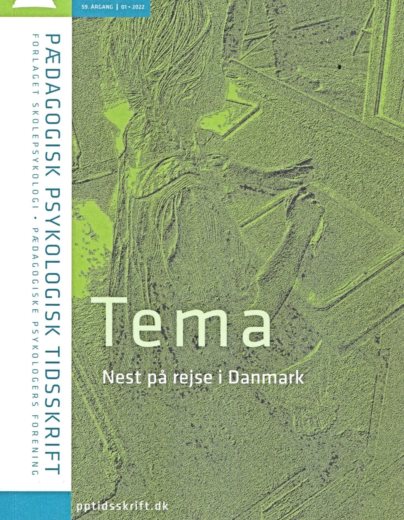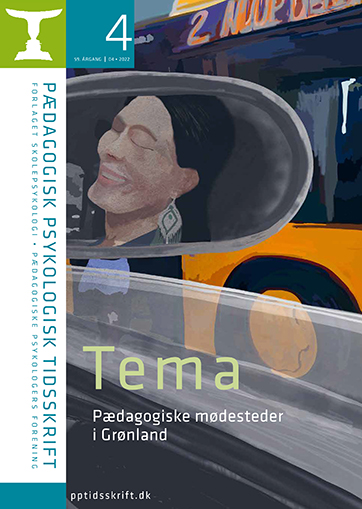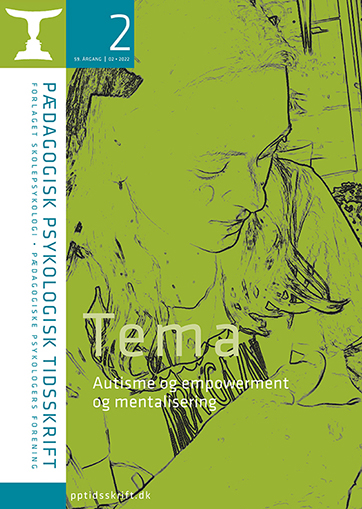Pragmatism in Nest becomes evident
By Anna Crawford Kromann, Lene Tanggaard and Katrine Tranum Thomsen
In this article, we argue that Nest in Denmark has philosophical pragmatism as its scientific and epistemological framework. It is crucial that the collaboration bet- ween PPR and schools/daycares take this framework into account because this fra- mework can transcend the dichotomy between the ideals of natural science and so- cial constructionism’s dissolution of any form of expertise – a dichotomy that has traditionally existed in the collaboration between PPR and schools/daycares. This also means that working with Nest can help support a more solid foundation that can mediate traditional forms of collaboration such as positions of expertise and po- sitions of facilitation which most PPR-workers attempt to navigate between.
Nest meets the ideology of welfare in Aarhus
By Anna Crawford Kromann and Lene Tanggaard
This article shows why and how Nest, an American pedagogical inclusion concept, has helped develop inclusive practices in public schools in Aarhus in collaboration with Pedagogical Psychological Services (PPR). In Aarhus, Nest was carefully translated and developed in the light of Danish educational practices. The coupling of these two approaches has helped identify new ways of contributing to state schools’ role in developing citizenship and a welfare society. The article is based on interdisciplinary qualitative research into the practices and inside experience of Nest. The research is a result of the collaboration between academic institutions, schools and PPR who co-develop Nest in Denmark.
Collaborative action and learning – Nest inspired co-creation in the Municipality of Svendborg
By Jacob Bogh Sønderby
The annulment in 2016 of national quantitative goals regarding the degree of in- clusion in Danish state schools could conservatively be seen as a renunciation of the inclusive agenda as such. However, it should rather be understood as an invitation to embrace a broader perspective of inclusion in general. Since 2019 in the Munici- pality of Svendborg, this task has politically been understood in a broader perspective and has as such been undertaken by focusing on diversity as a driving factor in all school development. For PPR, this has been seen as an invitation to rethink our pedagogical psychological approach and has led to the embarkment of a so-called “Nest-inspired close to practice approach”, formally designed as a three-year school intervention programme. Through collaborative efforts and co-creative processes, the objective has been to promote Nest theories and methods through locally custo- mised module-based approaches including sessions of educational dialogue, action learning, and leadership coaching. So far, the intervention programme has resulted in aspects of organisational learning and development, as well as the establishment of shared language, terminology, and working goals at PPR. It has, however, also led to an acknowledgement of several barriers, including issues as culture and va- lues in local schools, degree of professional reach of the Nest methods and aspects of motivation, all issues which continually present a challenge to establishing a shared mindset and to the efforts of changing practice.
Nest and the neuroaffective in Slagelse
By Benedikte Havndrup and Christine Christensen
In this article, we describe our experiences and perspectives in working with Nest. Firstly, we describe the background for choosing Nest pedagogy and what we wanted to achieve by working with Nest in the pedagogic collaboration at the Municipality of Slagelse. Subsequently, we present our Nest-inspired understan- ding of the motivation of the professionals in the mutual and dynamic Nest-lear- ning communities, where everyone can achieve a sense of purpose and meaning across contexts. In the last half of our article, we will – based on a practise-example
– describe how we identified what we were missing in Nest and how that became the beginning of the collaboration between Nest and the neuroaffective develop- mental psychology in Slagelse; a collaboration which is still being developed. Finally, we conclude the article with a few general points about the future of Nest in Slagelse – a future we remain curious and excited about.
Nest – a new approach to inclusive special education in Danish schools
By Micki Sonne Kaa Sunesen
Nest is an American concept that is used more and more in Danish schools. But why is that so? Why is Nest considered a meaningful and promising approach to inclusion in a Danish school? In a case study – qualitative interviews with three school leaders have been carried out. Results from these interviews were analysed and discussed with theory and research from the field of inclusion in a school con- text. The article points out that very little research has been conducted in Den- mark, but nevertheless, Nest as a pedagogical concept seems to spread fast – not just locally but all over the country. However, the small-scale research conducted is promising since the overall conclusion is that inclusive participatory trajectories are created by this approach for the good of all pupils, not only those diagnosed with autism. This is a relevant and fascinating finding since other Danish research shows that it is considered extremely difficult for schools in Denmark to create in- clusive schools where all pupils learn side by side.
ALFA classes in Viborg Municipality
By Line Husum Jensen, Lise Kirkegaard and Mads Rune Dahlstrøm
ALFA classes are the manifestation of a new school concept in Viborg Municipality, which integrates teaching methods from general education and special needs pro- grammes in a primary school setting. This new school concept is in part inspired by the Nest programme, as it is practised at Katrinebjerg School in Aarhus, and we describe how elements of the Nest programme are adapted to the local context and culture of Vestervang school in the year prior to the formal startup of ALFA classes in August 2021.
Through an adaptive course outline and experiential learning processes, the educational aim for the year prior to startup has been to focus on developing the competencies of the teaching staff in a dynamic interaction between newly acquired knowledge and already established practice. To ensure the success of the effort, it has been assessed that developing and optimising team-based work is a prerequisi- te for the ALFA classes to evolve into inclusive teaching environments, allowing all children to learn what they need to learn, to ultimately realise their full unique potential.
We believe that by integrating teaching methods from both general and special needs education, we can create a learning environment suited for all children. We hope to not only integrate the approaches from each field of education but also to overcome the somewhat artificial distinction between the two.
Nest in daycare
By Dorthe Møller Andersen, Karin Lykke and Katrine Tranum Thomsen
This article offers insight into how PPR and early childhood education institutions (dagtilbud 0-6 år) through Nest can cooperate at organisational and pedagogical levels to support a larger group of children to benefit from enhanced conditions for their development. We argue that the work with Nest supports early childhood institutions in their work with the strengthened pedagogical learning plan and the overall objective of the law for early childhood education in preventing negative so- cial heritage, as well as to support children with reduced psychological and physical ability (Ministry for Children and Education 2020). First, we do this by looking at how Nest can be understood as an approach for addressing enhanced learning environments. Second, we offer a critical perspective on how Nest in nurseries and kindergartens has been developed in Denmark to address the intentions in the strengthened pedagogical learning plan and has also been adapted, so it is compatible with the Danish context for early childhood education.
Some of the unanswered questions in Nest
By Thomas Szulevicz
The purpose of this paper is to engage in a discussion of some of the rarely asked questions that arise in the wake of working with NEST. The paper discusses
- Whether Nest leads to a special educational needs focus in general education,
- How pragmatically Nest can be interpreted, 3) Whether the reduced class sizes are the key to Nest’s success, and 4) Why an American educational concept is nee- ded in a Danish educational context.
Perspectives on Nest and “mellemformer”
By Jan Sejersdahl Kirkegaard
The article focuses on a larger perspective of the current nationwide work with Nest and “mellemformer” (initiatives that combine elements from special and regu- lar education). Significant historical and developmental trends, which have led to the current need to work with Nest and “mellemformer”, are described. The peda- gogical and organisational prerequisites that best support the work with Nest and “mellemformer”, as well as the specific factors that should be prioritised, are descri- bed in the article. Finally, the necessary processes in Nest and “mellemformer” that involve leaders, professionals, PPR and parents as crucial to the children’s well- being and development are presented.
Outbreak: Nest’s journey in Denmark
By Jeppe Agger Nielsen
New pedagogical concepts are continuously being developed. Some spread with great speed, some fade while others prove to be long-lasting. Nest’s fate has not yet been decided, but the gathering of experience with Nest in this journal points to a number of positive effects on the use of the concept in Denmark. The purpose of this article is to illuminate Nest from a “travel of ideas” perspective, as an illustration of how an American-based pedagogical concept is sought adapted, modified and de- veloped to a “Danish” version, enabling the Nest pedagogy to support Danish welfa- re and educational thinking.



